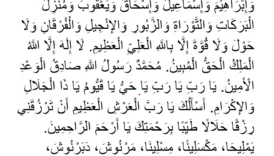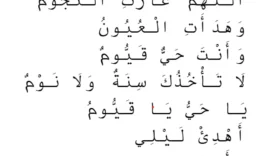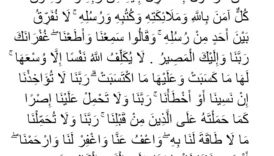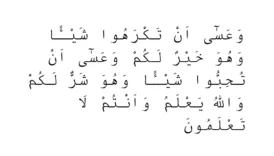A Special Salawāt for Fulfillment of Wishes
Below is a salawāt (invocation of blessings upon the Prophet) that is traditionally recited for any legitimate goal or need (ḥājah). It is believed that, provided the intention is not for something unlawful (ḥarām), by Allah’s grace the supplication can become a means for one’s wish to come true. However, if read with a haram motive, one risks losing divine blessing and intercession.
1. Method of Recitation and General Guidelines
- Three Days of Recitation:
- After the ‘Ishā’ (night) prayer, recite the following sequence:
- 3 times Sūrat al-Fātiḥah
- 3 times Āyat al-Kursī (Qur’an 2:255)
- 3 times Sūrat al-Ikhlāṣ
- Then, recite the special salawāt provided below 40 times.
- Maintain this routine for 3 consecutive nights.
- After the ‘Ishā’ (night) prayer, recite the following sequence:
- For Halal Wishes:
- The salawāt must be read with a permissible (halal) intention or goal.
- The tradition states that if read for haram purposes, the reader forfeits spiritual benefit and divine support.
- Seeing the Prophet in a Dream (Optional Extra):
- Some traditions mention that reciting this salawāt 40 times on a Thursday night (leading into Friday) before sleeping—with the intention of beholding the Prophet (peace be upon him) in a dream—can lead to such a vision.
- In that case, one is advised to rest with their back or side supported by a wall (or something similar).
2. Text of the Salawāt: Arabic, Transliteration, and Meaning
Arabic Text
بِسْمِ اللّٰهِ الرَّحْمٰنِ الرَّحِيمِ
اَللّٰهُمَّ صَلِّ عَلٰى مُحَمَّدٍ النَّبِيِّ الْمُخْتَارِ
وَعَدَدَ مَنْ صَلَّى عَلَيْهِ مِنَ الْأَخْيَارِ
وَعَدَدَ مَنْ لَمْ يُصَلِّ عَلَيْهِ مِنَ الْأَسْرَارِ
وَعَدَدَ قَطَرَاتِ الْأَمْطَارِ
وَعَدَدَ أَمْوَاجِ الْبِحَارِ
وَعَدَدَ رِمَالِ الْكَفَارِ
وَعَدَدَ أَوْرَاقِ الْأَشْجَارِ
وَعَدَدَ أَنْفَاسِ الْمُسْتَغْفِرِينَ بِالْأَسْحَارِ
وَعَدَدَ أَكْمَامِ الْأَزْهَارِ
وَعَدَدَ مَا كَانَ وَمَا يَكُونُ إِلَى يَوْمِ الْحَشْرِ وَالْقَرَارِ
وَصَلِّ عَلَيْهِ مَا اخْتَلَفَ الْمَلَوَانِ
وَتَعَاقَبَ الْعَصْرَانِ
وَكَرَّرَ الْجَدِيدَانِ
وَاسْتَقْبَلَ الْفَرْقَدَانِ
وَبَلِّغْ رُوحَهُ وَأَرْوَاحَ أَهْلِ بَيْتِهِ
مِنَّا التَّحِيَّةَ وَالتَّسْلِيمَةَ
وَعَلَى جَمِيعِ الْأَنْبِيَاءِ وَالْمُرْسَلِينَ
وَالْحَمْدُ لِلّٰهِ رَبِّ الْعَالَمِينَ.
اَللّٰهُمَّ صَلِّ عَلٰى مُحَمَّدٍ
وَعَلٰى آلِ مُحَمَّدٍ
بِعَدَدِ كُلِّ ذَرَّةٍ
أَلْفَ أَلْفِ مَرَّةٍ.
اَللّٰهُمَّ إِنَّا نَسْأَلُكَ
إِيمَانًا دَائِمًا
وَيَقِينًا صَادِقًا
وَقَلْبًا خَاشِعًا
وَلِسَانًا ذَاكِرًا
وَبَدَنًا صَابِرًا.
Transliteration (Approximate)
Bismillāhir-Raḥmānir-Raḥīm
Allāhümme ṣalli ‘alā Muḥammedin’n-Nebiyyil Muḫtār
ve ‘adede men ṣallā ‘aleyhi mine’l-aḫyār
ve ‘adede men lem yüṣalli ‘aleyhi mine’l-esrār
ve ‘adede qaṭarāti’l-emṭār
ve ‘adede emvāci’l-biḥār
ve ‘adede rimāli fil-kifār
ve ‘adede evrāqi’l-eşjār
ve ‘adede enfāsi’l-mustaġfirīne bi’l-esḥār
ve ‘adede ekmāmi’l-ezhār
ve ‘adede mā kāne ve mā yekūnü ilā yevmi’l-ḥaşri ve’l-qarār
ve ṣalli ‘aleyhi mā’ḫtelafe’l-melevāni
ve te‘āqabe’l-‘aṣrāni
ve kerrera’l-cedīdāni
vestaqbele’l-ferqadān
ve belliġ rūḥahu ve ervāḥa ehli beytihī minne’t-teḥıyete ve’t-teslīme
ve ‘alā cemī‘i’l-enbiyāi ve’l-mürselīn
ve’l-ḥamdu lillāhi rabbi’l-‘ālemīn
Allāhümme ṣalli ‘alā Muḥammedin ve ‘alā āli Muḥammedin
bi-‘adedi külli ẓerratin elfe elfi merratin
Allāhümme innā nes’elüke
īmānen dā’imen
ve yaqīnen ṣādiqan
ve qalben khāshi‘an
ve lisānen dhākiran
ve bedenen ṣābiran
(Minor variations may appear in different manuscripts, but the core text remains consistent.)
General Meaning (Condensed)
- This formula invokes countless blessings upon Prophet Muḥammad (peace be upon him) by measuring them against the number of raindrops, ocean waves, grains of sand, leaves of trees, breaths of those who seek forgiveness, etc.
- It asks God for continuous faith, true certainty, a humble heart, a remembering tongue, and a patient body.
3. How to Recite
- Three Consecutive Nights:
- After ‘Ishā’ prayer each night:
- Recite Sūrat al-Fātiḥah x3
- Recite Āyat al-Kursī (2:255) x3
- Recite Sūrat al-Ikhlāṣ x3
- Then, 40 repetitions of this salawāt.
- Repeat for 3 consecutive nights.
- After ‘Ishā’ prayer each night:
- Valid (Halāl) Intentions Only:
- Emphasized that one’s intention and request be free from haram motives.
- If used for unlawful requests, tradition warns of losing barakah (blessing) and intercession.
- Seeing the Prophet (s.a.w.) in a Dream:
- Some sources mention that if one reads this salawāt 40 times on a Thursday night (the eve of Friday) with the intention of seeing the Prophet (peace be upon him) in a dream, they might be honored with such a vision.
- In that scenario, it’s recommended to sleep in a somewhat upright or leaning position against a wall.
4. Spirit and Message of the Salawāt
- Extensive Salawāt (Blessings):
This invocation repeatedly calls for blessings on the Prophet Muḥammad (peace be upon him) in extraordinarily large quantities—“as many as raindrops, ocean waves, grains of sand,” etc. - Comprehensive Goodness:
It concludes with prayers for permanent faith, sincere certainty, a devout heart, a tongue of remembrance, and a patient body—encompassing both spiritual and moral well-being.
5. Key Reminders
- Sincerity (Ikhlāṣ) and Focus:
- Recite with heartfelt devotion. Do not treat it as a mechanical act of “wish fulfillment.”
- The acceptance of any du‘ā’ rests entirely with Allah.
- No Guarantee, but Hope:
- Islamic tradition often cites that sincerity, permissible intentions, and consistent worship can become avenues for answered prayers.
- This salawāt is not an absolute “formula,” but rather an expression of humility, love for the Prophet (peace be upon him), and reliance on God.
- Practical Efforts:
- Alongside prayer, believers should pursue lawful means (consultation, honest work, ethical behavior) relevant to their needs.
- Avoiding forbidden (ḥarām) aspirations is crucial for preserving spiritual benefit.
- Chain of Transmission:
- Direct references for this exact salawāt are more frequently found in prayer handbooks (mecmu‘as) and pious traditions rather than canonical hadith collections with well-known isnād verification.
- Many Muslim scholars have noted that in matters of virtue (faḍā’il) and supplications, it is allowable to use less strictly verified texts, provided they do not contradict core Islamic principles.
Conclusion
The recitation of this salawāt over three nights—after ‘Ishā’ prayer, preceded by certain short sūrahs—can be done with the hope that, by Allah’s permission, one’s permissible wishes or needs are fulfilled. Additionally, reading it 40 times on a Thursday night (heading into Friday) has been associated in some traditions with the aspiration to see the Prophet (peace be upon him) in a dream.
Ultimately, success belongs to Allah alone, and we petition Him to grant us good in this world and the Hereafter, answering our prayers in the best way.
May Allah accept your supplications, grant blessings in your life, and fulfill all lawful aspirations.





